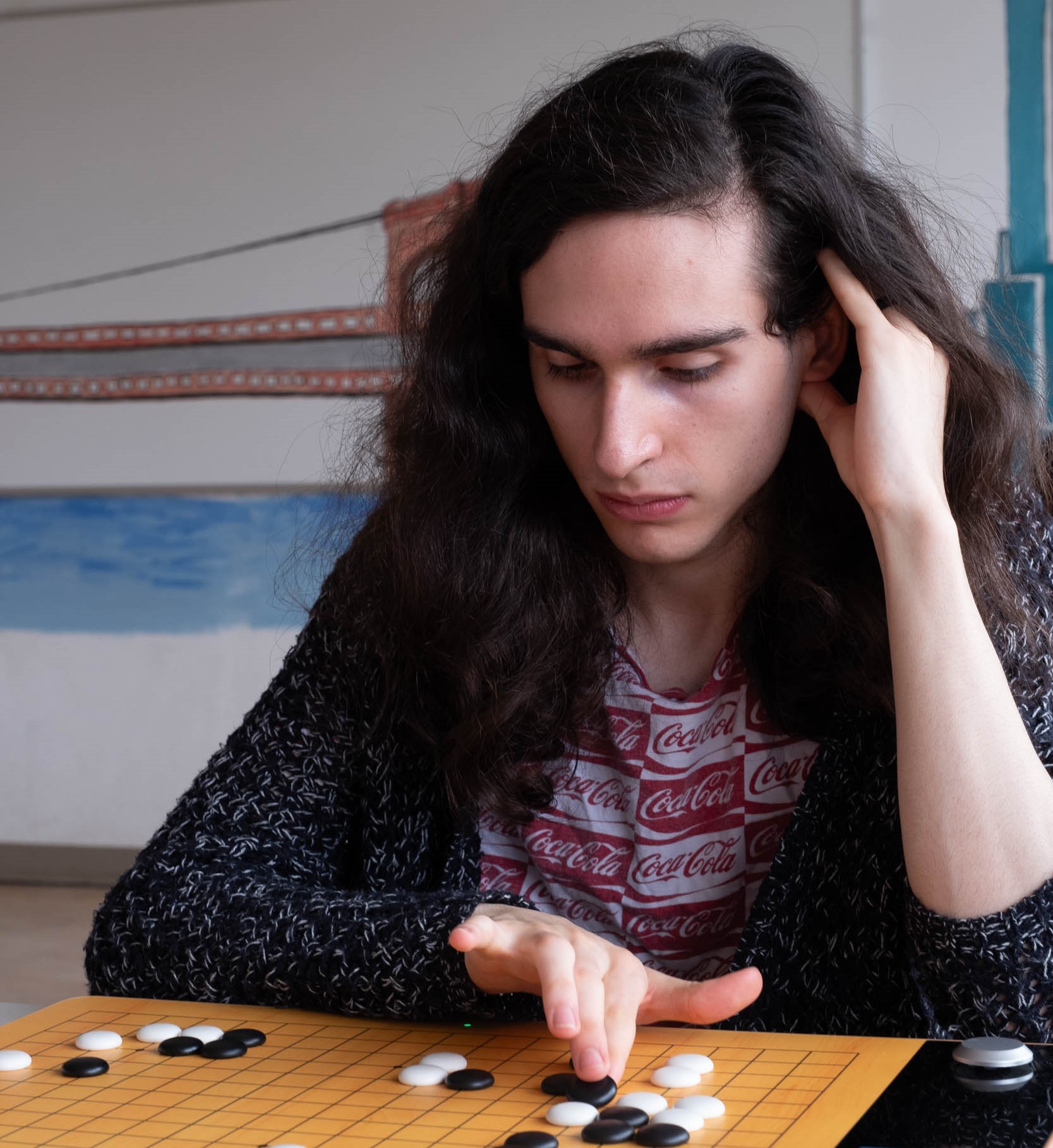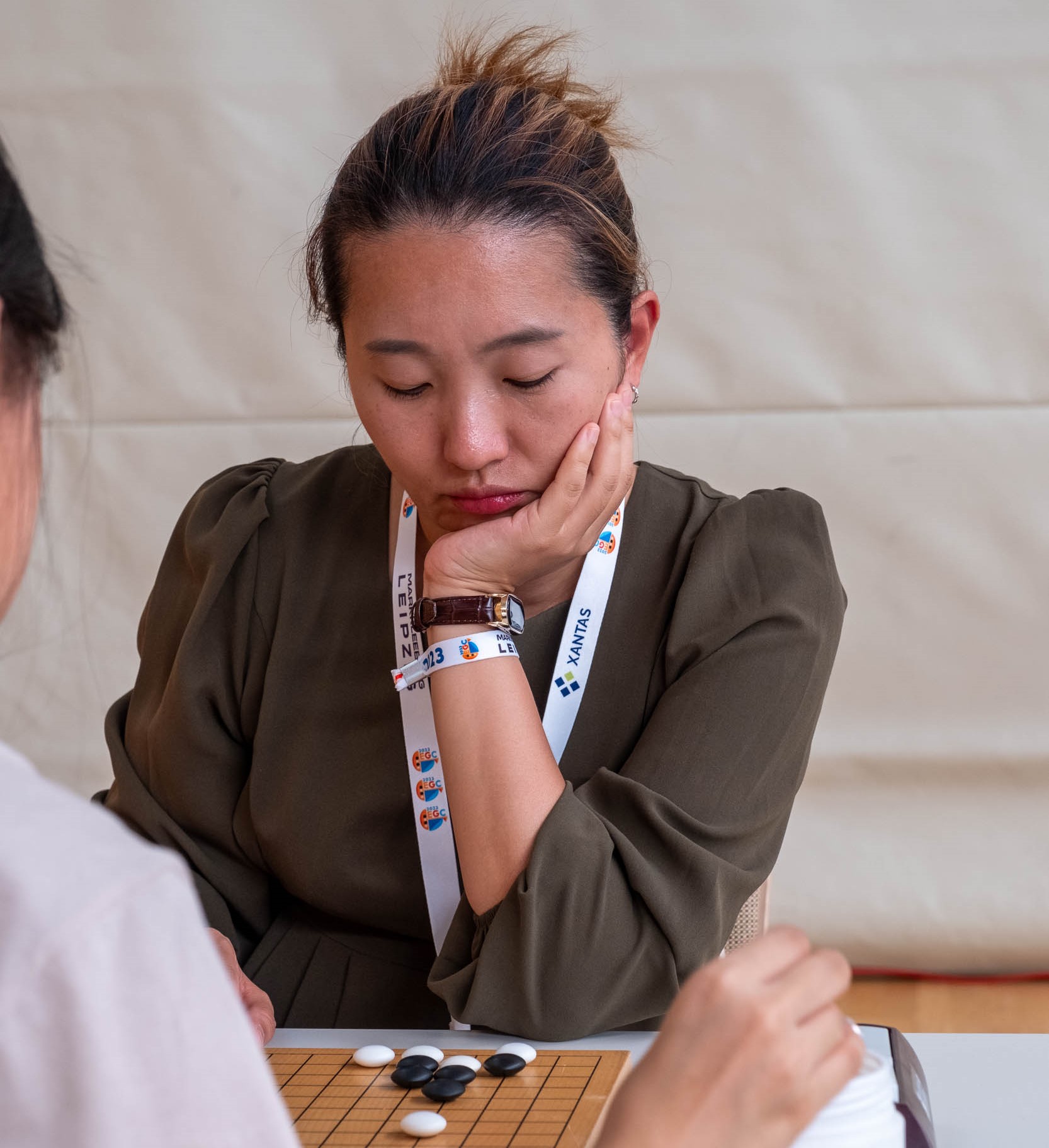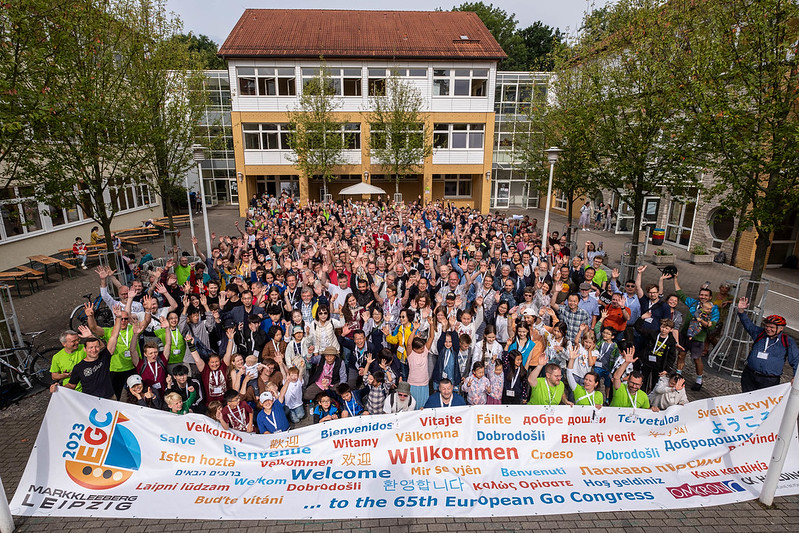After finishing their game in the small final of the European Championship, Ashe Vázquez 7-dan was kind enough to sit down with us for an interview.
.

Jeremy Kaiser: How old are you? What’s your profession?
Ashe Vázquez: I’m 20 years old. I study math at the moment and I worked as a Go teacher a little bit – but that’s not my main job. I think I at least want to study math for a while before I even consider doing Go full-time. Because Go as a career – in heavy quotation marks – is a bit of a dead end.
JK: How long have you been playing Go?
AV: A long time, since I was five! My mother taught me. My mother was also a mathematician. In Spain, Go survived in the obscure corners of math departments.
JK: What has your experience of the European Go Congress been so far?
AV: I didn’t expect anything going into the tournament. But once you get tot he semifinals, you start to dream idly of winning. I can’t say that much about the Congress, as I’ve been so focused on the European Championship. I wasn’t out partying, or even go the bars. I enjoyed the slow, meditative time settings and the gravitas. The best players at EGC are actually not in the European Championship. I would like to get some practice against the best players of the Open in the future.
JK: Any thoughts on today’s game against Fredrik?
AV: I played mirror Go, because I know Fredda doesn’t like mirror Go. In fact, he hates it so much he strongly advocated for it to be banned. I think I have a higher chance of beating a tilted Fredda than a happy one. So, I chose white for the first time this Congress. I made the dubious decision to sacrifice a whole corner. I was surprised to be told, the game was about 15 points worse for me and my sacrifice was abysmal. I knew it was bad, but it’s the type of game I like. I got this absolutely huge framework, the dynamic type of moyo games where you know the moyo is worthless because it can be invaded from everywhere, but your stones are all so strong. I thought I was 7 or 8 points worse tops. Later we got into some very complicated reading fights, because I have the influence and I’m supposed to be better at reading than Fredda. I’m worse than him at everything else and weh ave the same rating, so…(laughs). So I started some insane fight and thankfully I managed to outread him. I feel a bit lucky to have won in the end.
JK: So you’ve been playing double 5-4 point during fuseki a lot…
AV: To avoid theory. I mean playing 4-4 and the same san-san invasion every time is all fun and games, until it gets repetitive. And I find that most of my opponents have more experience in that type of poisitions. It’s not just about knowing the josekis, but understanding the position that comes later. How to use the framework you get and what the endgame follow-ups are. And I played 5-4 to avoid all oft hat.
JK: How would you describe your style of Go?
AV: Subject to change…Part of improving is reinventing your style. For a while you play worse. But then you figure out what you’re doing and your Go’s always a bit different. For this tournament, I’ve been playing very chaotic games. I enjoy them more than I remembered enjoying them. So I try to create very complicated positions…it’s fun, I like uncertainty.
JK: Do you have any role models?
AV: For technical play, definetely Fujisawa Shuko, he was a Japanese professional that played from the late 40s to 90s I guess. He has this very thick, patient style of play. It looks like they’re doing nothing and then in the second half of the game, the board explodes. That’s a style of play I find really appealing.
JK: Does the prevalence of AI in high level Go these days affect your enjoyment oft he game?
AV: Yes, actually. I default to studying older games or mid-level professional games. Players that play too much like AI, I don’t understand very well. Everyone thinks of Shūsaku, but there’s also Hon’inbō Shūei and Hon’inbō Shūsai, who had very different styles. Shūei is very thick and patient, and Shūsai is like „six groups on the board that all live somehow“…so their games are very entertaining and very high quality already.
JK: What do you like to do besides Go and math?
AV: I play a lot of video games, obviously…I’m really fond of some card games, Hearthstone for example. Some people like getting good at a game, some like being good at a game. One of the things I like about Go: it doesn’t change. The meta changes, but then you can still just play 5-4 (laughs). In Go, you can almost purely rely on fundamentals. Josekis are really not that important.
JK: Do you think the Go community should be more diverse?
AV: Diversity in the Go community is a very intersectional topic. For example, the top players are a very insular group and there’s a lot of invitational events. I’ve found the social atmosphere is not so friendly to weaker players. It’s also not so friendly to women, I’d say, as almost all players are men…I feel there’s a bit of a „bro atmosphere“ going on sometimes. At least I’m an openly queertop player and I don’t get openly treated badly by my peers. I hope it improves for the better, diversity is a fundamentally good thing. It’s really unfortunate when I see women being underrepresented in Go. In my mind it’s very clearly because oft he social atmosphere, and that’s really sad. It’s a bit less unfriendly towards queer people, that’s a bit odd actually. I really enjoyed how at this particular Congress, the organization was very loudly inclusive – that’s really appreciated as a gender and sexual minority, it sets the tone.
If I were to be an armchair sociologist for a second, I think that exposure therapy is always good for acceptance, e.g. transphobia goes down a lot once you meet a trans person.
JK: Are you aiming to become a professional player?
AV: It’s not my top priority, it’s certainly on my „would be nice“ list. It used to be a big goal of mine. It’s not that anymore, because I don’t need it to feel like a strong player. Like, I beat two pros this tournament and I don’t need the title to do this. I’ll keep playing the pro qualis ¬– it’s nice to have but it’s not a huge priority. I’d rather be European Champion than a pro, that’s more important to me. It’s more of an achievement. To be pro, you have to beat all the amateurs. To become European Champion, you have to beat all of the pros as well. And it’s a longer event with longer time settings, so it’s more grueling I would say. You get more upfront cash for winning the European Championship. For the pro quali, you get a title. A title is like a moyo – diffuse, unclear value. It’s valuable, because you can earn more money teaching and stuff like that. But that’s ironic, because it’s much less of an achievement I would say. I would have been much happier to be European Champion than I would’ve been to be a pro. In fact, I think reaching the semifinals is still a bigger achievement, though there it’s getting close.
JK: What are your goals for the future?
AV: My goal in life isn’t to be the best Go player, that’s more of a minor concern. At the moment I’m in the business of gaining skills that I hope to wield for good in the future. I think I have a certain responsibility to help the world, whatever that means. That’s not an actionable goal, but things are better when there’s more happiness and less suffering. I don’t know if youre familiar with Utilitarianism – it sucks as a moral philosophy, as it isn’t action guiding. Go is a fun hobby, and I hope my student’s lives are improved by me teaching them. But you can’t do that much with it in the world. I feel like Go players are a lot like academics, living in their own cocoon. Only, Go players are harmless, as their inventions don’t affect the world as much.
JK: I guess if you’re a Utilitarian, you might say they’re commiting harm by not putting their skills to a „better“ use…
AV: There is some implicit harm there. If you take a Utilitarian approach, it’s really hard to justify something like spending a week to play in a European Championship because you always think about what you could be doing with your time. You could be…
JK: …Saving kids in Africa?
AV: Exactly! (laughs) That type of attitude leads to burnout very quickly. It would be pretty immoral from that perspective to dedicate your life to playing Go. It has positive utility, but there is an opportunity cost.
JK: Do you have a message to your fans?
AV: Actually, I was really SHOCKED yesterday. A kid came up to me like „I watch your games, that was so cool, you’re so strong, I love your games“. I was like, wait a minute…I have a fan?
Message? Parasocial relationships are weird. (laughs)
JK: Anything else you’d like to say?
AV: I want to congratulate Andrii for winning the European Championship. I thought he played fantastically. I think he’s improved a lot since he became pro and that’s really cool to see. I’m always impressed by Fredda, he didn’t play tournaments for a long time. The reason I won is because I got the type of game that favours me. He’s propably the better player and he’s consistently doing very well. He’s clearly shown he is one of the best players in Europe.



